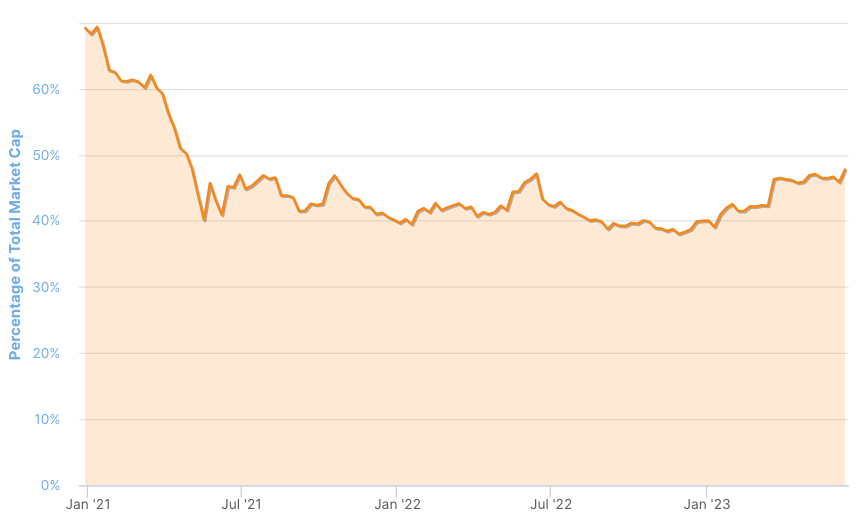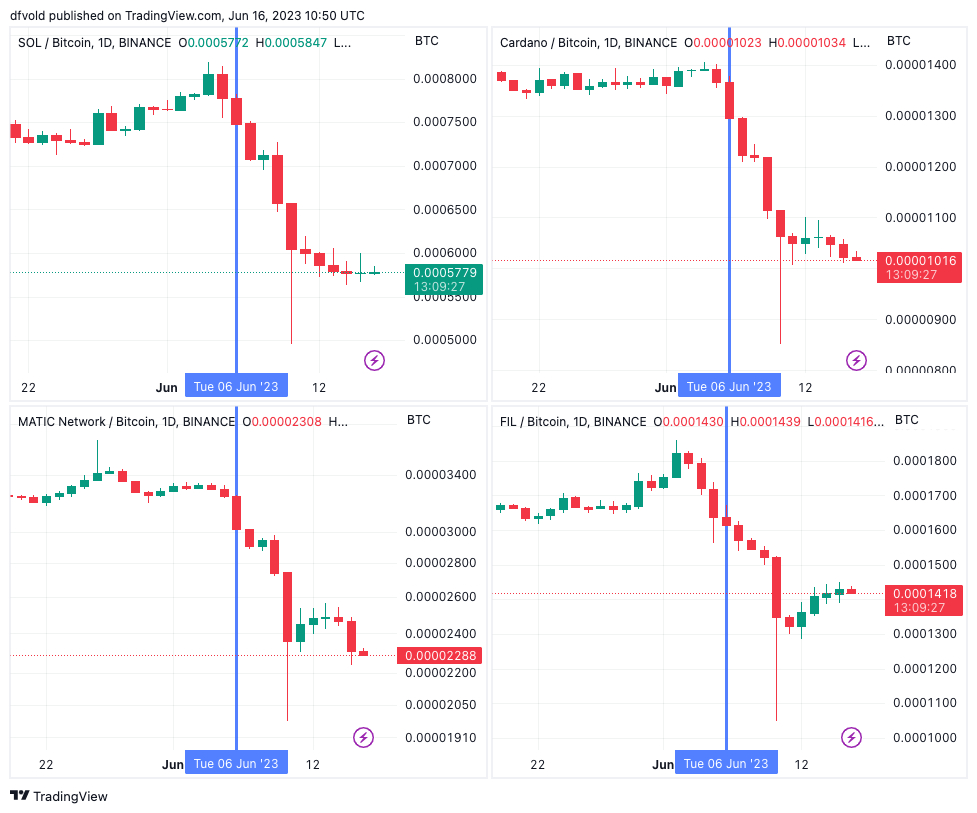Bitcoin’s share of the overall crypto market capitalization, the so-called Bitcoin dominance, is close to reaching a two-year high amid a regulatory crackdown on altcoins and crypto companies in the US.
As of Friday at press time, the Bitcoin dominance stood at 47.8%, just below a short-lived peak from July of 2021 that reached 48.2%.
Excluding the July 2021 spike, Bitcoin’s dominance over the crypto market has not been stronger since May the same year when BTC sold off heavily after reaching its first peak in the 2021 bull-run.

The steady rise in dominance seen this year comes as the issuers of many altcoins and other more or less centralized crypto service providers have faced tougher scrutiny by regulators, in particular in the US.
SEC names tokens as “securities”
In its recent lawsuits against Coinbase and Binance, the US Securities and Exchange Commission (SEC) even went so far as to name specific tokens as “investment contracts, and thus as securities.”
The tokens named by the SEC were SOL, ADA, MATIC, FIL, SAND, AXS, CHZ, FLOW, ICP, NEAR, VGX, DASH, and NEXO.
Since the lawsuit against Coinbase, all of the altcoins named as securities have fallen sharply in BTC terms.

“SOL is not a security”
Among those who have responded to their token being named as a security by the SEC was the Solana Foundation, which in a statement insisted that “SOL is not a security.”
“SOL is the native token to the Solana blockchain, a robust, open-source, community-based software project that relies on decentralized user and developer engagement to expand and evolve,” the Solana Foundation said at the time.
For now, however, both the SEC and other regulators such as the Commodity Futures Trading Commission (CFTC) appear to be in agreement that at least Bitcoin is a commodity, and therefore not a security.
Meanwhile, the situation for Ethereum’s native ETH token is less clear, and there is a real fear in the community that ETH could also be declared a security along with other altcoins.
If ETH is deemed a security for regulatory purposes, an even stronger regulatory crackdown on nearly all cryptos other than Bitcoin can be expected from US regulators, with an even higher Bitcoin dominance as a likely consequence.
Bitcoin’s share of the overall crypto market capitalization, the so-called Bitcoin dominance, is close to reaching a two-year high amid a regulatory crackdown on altcoins and crypto companies in the US.
As of Friday at press time, the Bitcoin dominance stood at 47.8%, just below a short-lived peak from July of 2021 that reached 48.2%.
Excluding the July 2021 spike, Bitcoin’s dominance over the crypto market has not been stronger since May the same year when BTC sold off heavily after reaching its first peak in the 2021 bull-run.

The steady rise in dominance seen this year comes as the issuers of many altcoins and other more or less centralized crypto service providers have faced tougher scrutiny by regulators, in particular in the US.
SEC names tokens as “securities”
In its recent lawsuits against Coinbase and Binance, the US Securities and Exchange Commission (SEC) even went so far as to name specific tokens as “investment contracts, and thus as securities.”
The tokens named by the SEC were SOL, ADA, MATIC, FIL, SAND, AXS, CHZ, FLOW, ICP, NEAR, VGX, DASH, and NEXO.
Since the lawsuit against Coinbase, all of the altcoins named as securities have fallen sharply in BTC terms.

“SOL is not a security”
Among those who have responded to their token being named as a security by the SEC was the Solana Foundation, which in a statement insisted that “SOL is not a security.”
“SOL is the native token to the Solana blockchain, a robust, open-source, community-based software project that relies on decentralized user and developer engagement to expand and evolve,” the Solana Foundation said at the time.
For now, however, both the SEC and other regulators such as the Commodity Futures Trading Commission (CFTC) appear to be in agreement that at least Bitcoin is a commodity, and therefore not a security.
Meanwhile, the situation for Ethereum’s native ETH token is less clear, and there is a real fear in the community that ETH could also be declared a security along with other altcoins.
If ETH is deemed a security for regulatory purposes, an even stronger regulatory crackdown on nearly all cryptos other than Bitcoin can be expected from US regulators, with an even higher Bitcoin dominance as a likely consequence.
